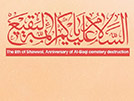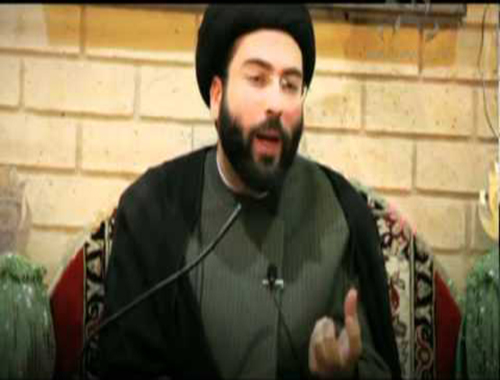
Abbas (A.S) could no longer bear life after having seen how his companions and the members of his family killed and how the Hujjah of his time was suffering from the great number of the enemies surrounding him after his supply route had been cut off and after hearing the women wailing and the children crying of thirst. He, therefore, sought permission from his brother. Since Abbas (A.S) was the most precious asset to the grandson of the Prophet (P.B.U.H&H.P), who is soon to be martyred, especially since the foes always dreaded having to fight him and feared his advance, and how the ladies felt a sense of security upon seeing the standard raised high, the sacred soul of the Father of the Oppressed did not accept to part with him. The Imam (A.S) said to him, “O brother! You are my standard-bearer!” Abbas (A.S) said, “I am fed-up with these hypocrites, and I want to seek revenge against them.” Hussain (A.S) ordered him to bring water for the children, so Abbas went to those people and admonished them, warning them of the Wrath of the Omnipotent, but all of that fell on deaf ears.
He then shouted: “O Umar ibn Sa'ad! Here is Hussain son of the daughter of the Messenger of Allah! You have killed his companions and family, and here are his children suffering from thirst! Give them some water, for thirst has burnt their hearts!” As he kept repeating his pleas, he also kept saying to them, “Let me go to Rome or to India, and I shall leave Hijaz and Iraq for you all.” There were some people among the enemy ranks who were genuinely moved by those pleas, so they wept, but Shimr shouted as loudly as he could, “O son of Abu Turab! Had the face of earth been entirely covered with water, and had it been in our hands, we would still have not given you a drop of it to drink unless you swear the oath of allegiance to Yazid!”
Abbas went back to his brother to tell him of the outcome of his negotiations with those ruffians. Abbas heard the children crying of thirst, so he could not tolerate the situation any longer. He was fired up with his Hashemite zeal.
Then he rode his horse and took the water bag. As many as four thousand archers soon surrounded him and shot him with their arrows, yet their large number did not impede his attempt. He kept chasing those throngs alone as his standard kept fluttering above. Those people could not tell whether that was Abbas who was thus slaughtering their heroes. Their men could not maintain their grounds before him, and he succeeded in getting into the Euphrates River heedless of the huge crowd around him.
The moment he took one handful of water to drink he remembered how thirsty Hussain (A.S) and those with him were, so he spilled it then said:
O soul! After Hussain nobody does count!
After him, you should to nothing amount,
Here is Hussain nearing his end
While you drink of cool water?!
By Allah! Such is not a deed
At all enjoined by my creed!
Then he filled the water bag, rode his horse, and went in the direction of the camp. His path was blocked, so he kept killing those who blocked it till he was able to make his way through them as he was saying:
I do not fear dead when it calls upon me,
Till among the swords you bury me.
My soul protects the one
Who is the Prophet's grandson?
Abbas am I, the water bag do I bear
When I meet evil, I know no fear!
Zayd ibn Arqam ambushed him from behind a palm tree assisted by Ibn Tufail, dealing a sword blow to his right arm, completely severing it. He (A.S), said:
By Allah! If you cut off my right hand,
I shall not cease defending my creed,
And an Imam true to his conviction do I defend,
A son of the trustworthy Prophet whom Allah did send.
He did not pay attention to the fact that his right hand had been cut off because he was only concerned about getting the water to the children and the family of Hussain (A.S), but Ibn Tufail was still hiding another palm tree when he passed by. Hakim struck him with his sword on his left hand, amputating it, too, and soon a large number of men were surrounding him. Arrows fell on him like rain, piercing the water bag and boring a hole in it through which its water was completely spilled. An arrow pierced his chest. A man hit him with a pole on his head, severely injuring him.
He fell on the ground shouting, “Peace unto you from me, O father of Abdullah!” Hussain (A.S) rushed to him.
How I wish to know in what condition he went to him, with a soul imperiled by this great loss, or by the brotherhood that pulls a brother to his beloved brother....
Yes; Hussain (A.S) reached him and witnessed how sacrifice is being offered to the Holy One on a plain covered with blood and crowned with arrows. Abbas had no might nor speech nor anything whereby he could keep his foes away. He could not even see anything; his head was on the ground bleeding.
Is it accurate to say that Hussain (A.S) saw all of these calamities and still had any strength whereby he could stand on his feet? Only Hussain remained after the martyrdom of Abbas. He remained a figure staring in the sky, stripped of all the necessities of life. He (A.S) described his condition best when he said, “Now my spine has been split and my endeavor is further weakened.”
He left him where he had fell and did not move him anywhere due to a hidden reason which time later unveiled:
He was to be buried where he had fallen separately from the other martyrs so that he would have a mausoleum of his own visited by those who seek his intercession with the Almighty to grant them the fulfillment of their wishes, and so that his grave-site would be a place for the people who seek nearness to the Almighty, Praise to Him, under its dome that stands lofty in the sky, glowing. It is there that dazzling miracles manifest themselves and the nation thereby comes to know his lofty status and station with Allah Almighty. It then carries out its obligation of loving him which is renewed by continuous visits. Greeting him will establish a link between them and Allah, the most Exalted.
Hussain (A.S) went back to the camp feeling extremely depressed, tearful. He kept wiping his tears with his cuffs as men raced with one another to assault his camp. He called out: “Is there anyone who helps us?! Is there anyone who grants us security?! Is there anyone who seeks justice, so he supports us?! Is there anyone who fears the Fire, so he defends us?!” Roghayya, his daughter, came to him and asked him about her uncle Abbas.
He told her of his being killed. Zainab heard him revealing this sad news, so she cried out, “O brother! O Abbas! O our loss after you!” Women wept, and Hussain (A.S) wept, too, and said, “O our loss after you!”
Maqtal al-Hussain- Martyrdom Epic of Imam al-Hussain (A.S)
By: Abd al-Razzaq al-Muqarram
 Abbas (A.S) - Islam Guidance
Abbas (A.S) - Islam Guidance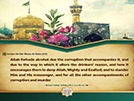
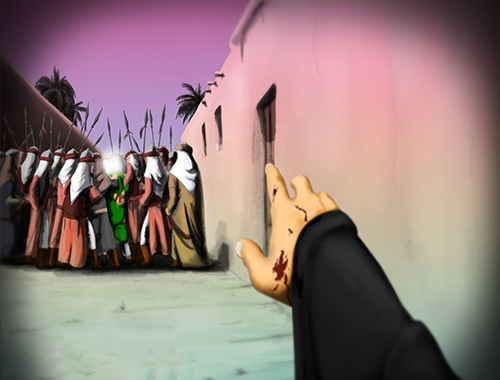
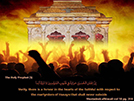
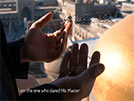
![take advantage of your [present] time](/en/media/com_hwdmediashare/files/99/f5/fb/5293162f4d04afb1ed8da3034e984340.jpg)


